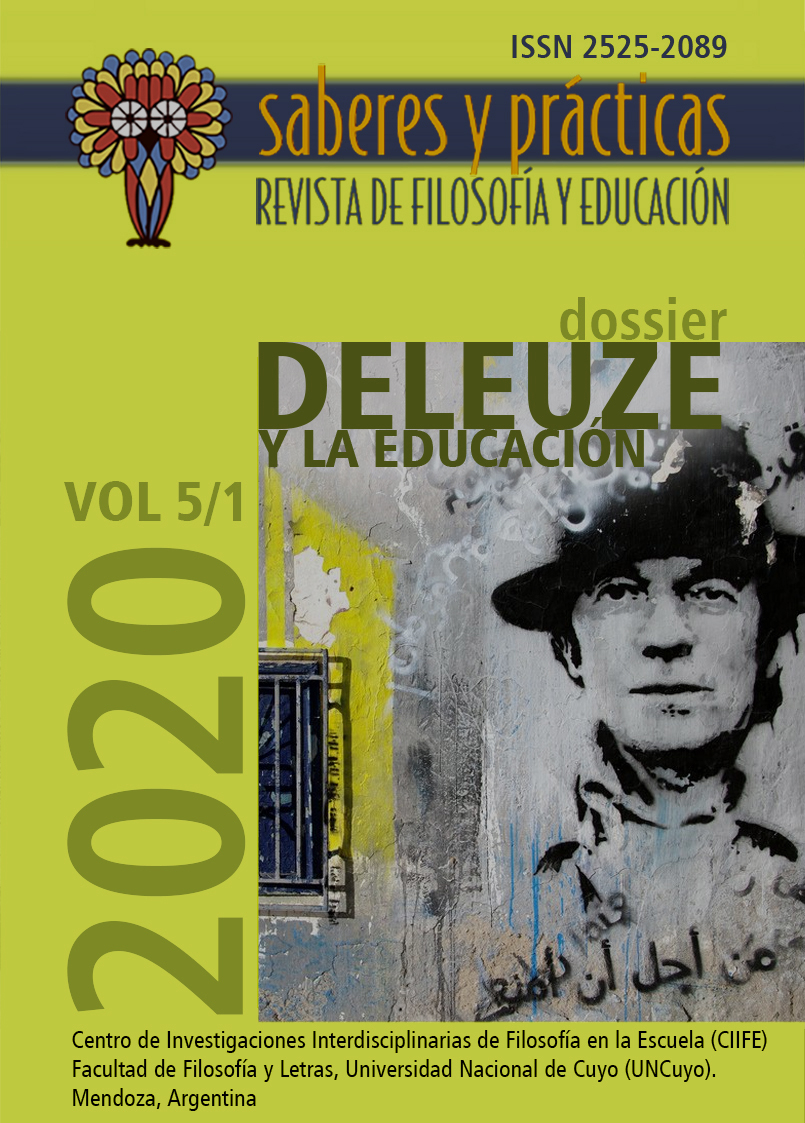Education as a potency in times of neoliberalism and fundamentalisms
Keywords:
Schizoanalysis, Education, Capitalism, Fundamentalisms, Gilles DeleuzeAbstract
The goal of this article is to reflect about the different models of education in Brazil, based on an analysis of their diagrams of forces. Our method of reflection is based on the theoretical repertoire of schizoanalysis, created by Gilles Deleuze and Félix Guattari. We seek to make a cartography, a map, of its configurations of forces. Then, we carry out an analysis of the micropolitics of the forces involved in the Institution-Education in the current times. As results, we found three modalities of education: neoliberal education, fundamentalist education and education as power. The first updates the axiomatic of capital, being an educational modality mobilized by hyperproductivity. The second acts according to the logic of negativity, committed to prohibition, standardization, and censorship. Finally, the latter is configured as an active utopia, which through a haptic dimension seeks to produce processes of empowerment and transformation.
Downloads
References
Baremblitt, G. (1998). Introdução à esquizoanálise. Instituto Félix Guattari.
Baremblitt, G., Amorim; M. y Domenico Uhng, H. (2020). Esquizodrama. Teoria, método, técnica: klínicas. Instituto Gregorio Baremblitt.
Bey, H. (2001). TAZ: Zona autônoma temporária. Conrad.
Castoriadis, C. (1982). A Instituição imaginária da sociedade. Paz e Terra.
Deleuze, G. (1968). Spinoza et le problème de l’expression. Minuit.
Deleuze, G. (1976a). Nietzsche e a filosofia. Sociedade Cultural.
Deleuze, G. (1976b). Espinoza e os signos. Rés.
Deleuze, G. (1985). "O pensamento nômade". En Nietzsche hoje? – Colóquio de Cerisy. Compilado por Scarlett Marton. Brasiliense.
Deleuze, G. (1992). Conversações. Ed. 34.
Deleuze, G. (1994). O Abecedário de Deleuze. Vídeo.
Deleuze, G. (2002). Espinosa: filosofia prática. Escuta.
Deleuze, G. (2006). Diferença e Repetição. Brasiliense.
Deleuze, G. (2007). Pintura: el concepto de diagrama. Cactus editorial.
Deleuze, G. (2014). El poder: curso sobre Foucault (Tomo 2). Cactus editorial.
Deleuze, G. (2017). Derrames II: Aparatos de Estado y axiomática capitalista. Cactus editorial.
Deleuze, G. y Guattari, F. (1976). O Anti-Édipo. Imago.
Deleuze, G. y Guattari, F. (1995). Mil Platôs: Capitalismo e Esquizofrenia, Vols. 1 a 5. Ed. 34.
Deleuze, G. y Guattari, F. (2010). O Anti-Édipo. Ed. 34.
Foucault, M. (2002). A verdade e as formas jurídicas. Nau.
Guattari, F. (1981). A Revolução Molecular. Brasiliense.
Guattari, F. (1990). As três ecologias. Papirus.
Guattari, F. (2015). ¿Qué es la Ecosofía?: textos presentados y agenciados por Stéphane Nadaud. Cactus editorial.
Han, Byung-Chul (2012). La sociedad del cansancio. Herder editorial.
Hur Uhng, D. (2015). Axiomática do capital e instituições: abstratas, concretas e imateriais. Polis e Psique, 5(3), 156-178. http://pepsic.bvsalud.org/scielo.php?script=sci_arttext&pid=S2238-152X2015000200010
Hur Uhng, D. (2018a). Psicologia, Política e Esquizoanálise. Campinas: Alínea.
Hur Uhng, D. (2018b). Deleuze e a constituição do diagrama de controle. Fractal: Revista de Psicologia, 30 (2), 173-179. https://doi.org/10.22409/1984-0292/v30i2/5507
Hur Uhng, D. y Sabucedo, J. M. (2020). Psicologia dos extremismos políticos. Vozes.
Lazzarato, M. (2014). Signos, máquinas, subjetividades. Edições SESC; n -1 edições.
Passos, E., Kastrup, V. y da Escossia, L.( 2010). Pistas do método da cartografia. Sulina.
Rolnik, S. (1989). Cartografia sentimental: transformações contemporâneas do desejo. Estação Liberdade.
Rolnik, S. (1997). "Psicologia: subjetividade, ética e cultura". En Saúdeloucura, 6: Subjetividade. Hucitec.
Rosa, L. y Sandoval, S. (2019). Ocupação Estudantil no Instituto Federal de Catanduva (SP): potência, desenvolvimento e práxis. Revista Psicologia Política, 19(45), 317-334. http://pepsic.bvsalud.org/scielo.php?script=sci_arttext&pid=S1519-549X2019000200013&lng=pt&tlng=pt
Saldaña, P. (2020). Novo presidente da Capes defende criacionismo em 'contraponto à teoria da evolução'. Folha de São Paulo, 24/01/2020. Acesso em 18 de fevereiro de 2020 de https://www1.folha.uol.com.br/educacao/2020/01/novo-presidente-da-capes-defende-criacionismo-em-contraponto-a-teoria-da-evolucao.shtml
Published
How to Cite
Issue
Section
License

This work is licensed under a Creative Commons Attribution-NonCommercial-ShareAlike 2.5 Argentina License.





















